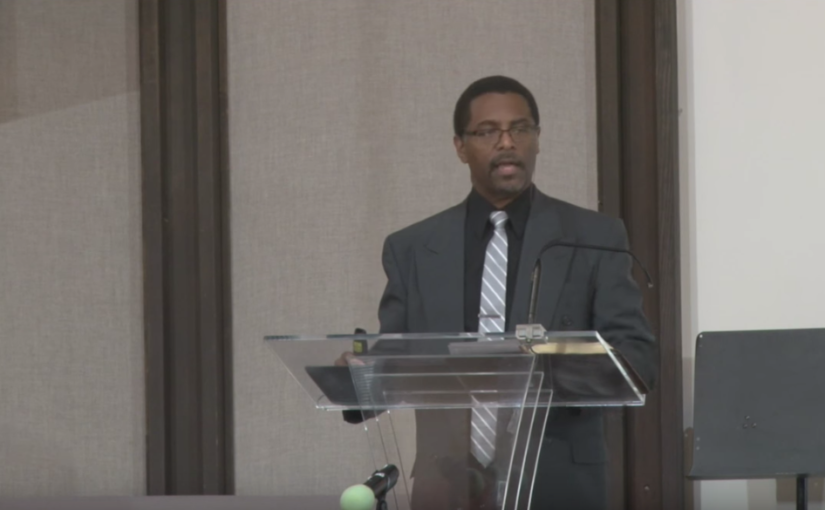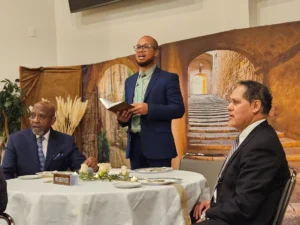On Sabbath we did a deep dive into the portion of Peter’s letter dealing with suffering for the cause of Christ. Rewind to 1 Peter 2:11-25. Here we see three categories of steps Peter says we’re to follow as believers in an unbelieving world. Those steps are 1) Separation (vs. 11-12): submission (vs. 13-20); and suffering (vs. 21-25).
Separation. Though Peter’s readers were a people “belonging to God,” they were “foreigners and aliens” in the world they were living in. If you are at home with God, you are a stranger to the world (see 1 John 2:15-17). Peter is reminding the Gentile converts that this world is not their home and neither is it ours. Hope wins when you make up your mind about where you call home. You can be in Jesus and live in the world, but you can’t be in Jesus and be of the world.
The step of separation includes abstention from “sins of the flesh” which takes in much more than just sexual sins. See Galatians 5:19-21. In the New Testament, “flesh” stands for far more than the physical nature; it stands for human nature apart from God. It refers to life lived without the standards, help, grace and the influence of Christ. It is me in the raw, not me in Christ, and it includes hatred, discord, jealousy, fits of rage, selfish ambition, partisanship, and envy, and not just the grosser sins.
Peter is telling his readers not to live like this because there were being accused of immoral behaviors and being disruptors of family relationships. Peter’s advice to them is to Deal with slander by doing good. Live such exemplary lives that even if they don’t like you, they can’t say anything against you. Every Christian is an advertisement for Christianity; by his or her life, he or she either commends it to others, or makes them think less of it. What kind of advertisement are you?
Submission (vs. 13-20). Some were claiming Christian “liberty” (from the law) as an excuse to party or rebel. Christians are still doing the same today. But God is not fooled. He knows whose are His and who is only faking it.
Only slaves to God are truly free. Most people interpret being “free” as free to do what I please. But Christian freedom means living free to do what pleases God. If you would save your life, you must lose it; and if you would be free, you must be a slave to God.
Verse 17 yields four commands for servants of God:
- Show proper respect to everyone. How you treat the waitress, flight attendant, Uber driver or custodian is a greater measure of our Christianity than our prayers.
- Love the brotherhood of believers.
- Fear God
- Honor the King. Even if He’s corrupt! Remember, this was written with Nero in Rome!
That brings us to the Step of Suffering Patiently [Vs. 18-20]. Peter’s words here are addressed to those with the least status or power in Greco-Roman society—slaves. As such they couldn’t control or be responsible for someone else’s behavior, they could only be responsible for their own. And for them and us—slaves of God—our first obligation is to God.
The “unjust suffering” that Peter addresses is not suffering caused by the human condition—illness, aging, death or the consequences of one’s own sins and poor judgment. This is to suffer simply because one is a Christian.”
Rewind to 1 Peter 1:21 for the key text explaining the Why and How of unjust suffering. “To this you were called, because Christ suffered for you, leaving you an example, that you should follow in his steps” (1 Peter 2:21). What have we been called to? Patiently bearing suffering for the cause of Christ.
Most today think the call of Christ is to come and prosper, or come and have a latte. Most of us didn’t sign up for this. Peter will use the word “suffer” in various ways 16 times in this letter. His writings provide us with a doctrine of suffering, and it starts with him saying Jesus is the example we’re to follow. See verses 22-23.
Peter lists first what Jesus didn’t do:
- “He committed no sin, and no deceit was found in his mouth.” Jesus did not sin by the things used against Him—lies and deception.
- “He did not retaliate…”
- “He made no threats.” Peter’s readers were being verbally abused, the victims of “ignorant talk” (2:15), “insults” (3:9); and “slander” (3:16). Obviously, their greatest temptation would have been to respond by stretching the truth, putting their opponents in a bad light, speaking abusively of others, or making threats. How did Peter know that believers 20 centuries later would be tempted the same way?
Peter points us to Jesus and says, “Do not repay evil with evil or insult with insult. On the contrary, repay evil with blessing, because to this you were called so that you may inherit a blessing.” 1 Peter 3:9. Hope wins in suffering when you bless instead of curse.
Peter doesn’t just list the things Jesus did not do, but also what He did: “He entrusted Himself to [God].” Under the pressure of insult and slander, Jesus continued to trust God. (See Mt. 27:27-31; 39, 41, 44; and Luke 23:46.)
“Entrust” in the Greek means to “hand over.” It’s also the same word for “betray.” The secret of Jesus going through the suffering of the betrayal, condemnation and the cross was that He had “handed himself over” to God before Judas “handed him over” to the authorities. By the time Judas came to hand Jesus over he was too late, because Jesus had already handed himself over to God!
Peter later tells his readers, and us, to do the same in 4:19 – “So then, let even those who suffer according to the will of God entrust themselves to the faithful Creator by doing good.” Hope wins in suffering when you entrust yourself to God.
Entrusting yourself to God in suffering is also an act of worship. Christians are faith’s first responders who are called to respond first in worship. (See Job 1:20; 2:10.) Responding in the flesh is only human. But God expects more from us. Worship fixes my eyes on Jesus, not on church committees, votes, or policies. Worship reminds me that it’s not about me but all about Him. Worship keeps me focused on Christ and Him crucified, risen, and coming again. And when I worship Him first, then “all these [other] things will be added to me” as well. (See Mt. 6:33.) Hope wins in suffering as you worship.
Jesus died that we might live. By His wounds we were healed (see 1 Peter 2:24-25). Peter’s Christology—His study of the atonement—leads him to the conclusion that suffering as Christ did (without deceit, retaliation, and entrusting Himself to God) is Jesus’ way to save souls.
Just as Christ’s wounds broke your heart and lead you to repent and find healing, your “wounds,” inflicted by unjust suffering, and the way your respond to them, can lead others to repentance and healing also. It’s not about saving self, but about saving others. Hope wins when suffering is transformed into an act of redemption. To this, Peter says, you were called. And, “If you are insulted because of the name of Christ, you are blessed.” (4:14). May you have the courage and strength to follow in Christ’s steps today.–Pastor Randy





